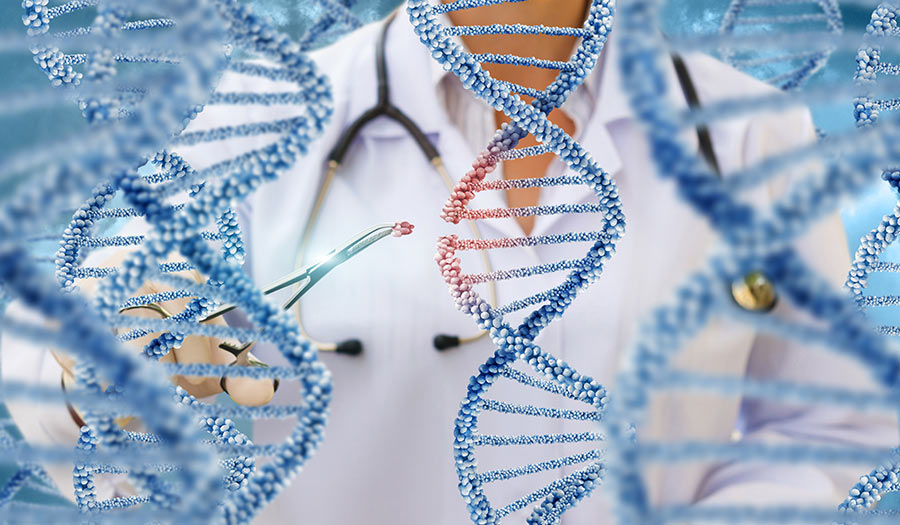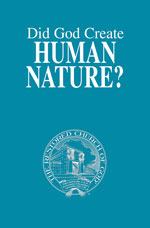 Getty Images
Getty Images
Article
Scientists are now editing DNA with high hopes of healing every disease. The techniques are rapidly advancing and incredibly promising—but the ethics are murky.
Learn the why behind the headlines.
Subscribe to the Real Truth for FREE news and analysis.
Subscribe NowDescribed as a word processor for DNA, CRISPR is a tool that can edit the DNA of living creatures. This is no longer simply interesting research and cutting-edge science, it is now being considered for practical medicine. The uses for this technique are widespread: curing genetic diseases and cancer, reversing and stopping aging, as well as subtler and potentially concerning changes to genes such as changing eye color, or making children smarter and stronger.
As with every new technology there are overexuberant enthusiasts who feel CRISPR can solve nearly all of mankind’s problems, from disease to war. Likewise, there are critics and skeptics who do not accept that this is really happening or who assume that it could never work.
However, this is not something happening years from now that we can speculate on. Scientists—as well as amateurs—are altering the DNA in living human beings today.
Bacteria’s Immune System
CRISPR is an acronym for “clustered regularly interspaced short palindromic repeats.” While this sounds complicated, it is a technology based on the defense system of bacteria. Some bacteria and other microorganisms contain DNA that serves as their immune system against viruses. Using a built-in matching mechanism, the bacteria can identify and compare the genetic code of viruses against the list of viruses within their immune system. If a match is found, the bacteria cuts up or “edits” the invading virus’ genetic code, rendering it harmless. The process has been compared to the “cut and paste” feature of a word processor or more accurately its “find and replace” function.
The breakthrough came when scientists found that they could use this same technique to edit DNA in other organisms. Editing DNA was possible before CRISPR but what CRISPR has done is provide a much more accurate method of doing so, making it much cheaper and easier.
Bioengineering at Home
An introductory CRISPR kit can be purchased online for about $160. Anyone can buy one and carry out their own simple experiments. More advanced sets are available, but still relatively affordable.
While the basic kit walks you through a process to make specific edits to bacteria, the more advanced ones allow greater control over the entire genome. Some are really pushing the envelope and trying, as one blogger said, to make it so that “anyone has an inexpensive way to take any gene from any organism and effectively insert it into human cells.”
It is only a matter of time before people attempt to do things such as insert animal traits into human beings.
The prospect of the average person having the ability to edit human DNA has invigorated a biopunk and transhuman subculture that encourages a do-it-yourself ethic and seeks to improve people to the point of “post-human” abilities.
During a small presentation that was filmed and posted to the internet, one biohacker injected himself with edited DNA with the hopes that it would eventually transform some cells in his body and give him bigger muscles. He also gave those present baggies so they could inject themselves.
While DIY biology is a notable trend, medical science has not yet accepted people seeking to improve their abilities. However, what they are interested in is addressing previously untreatable diseases.
Medical Advancements
Work is already underway to cure devastating diseases such as cancer and AIDS. Human trials to treat lung cancer were first started in China in August 2016. A year later, an international team of researchers used CRISPR to correct a disease-causing mutation in dozens of human embryos. The study was described by Nature.com as “a significant improvement in efficiency and accuracy over previous efforts.”
CRISPR was also recently seen as a viable way to treat Huntington’s disease, a fatal condition caused by the breakdown of nerve cells in the brain. Researchers have used DNA editing to reverse the effects of the disease in mice and are looking forward to starting human trials. We may soon see the first debilitating disease simply deleted from a living human being.
Research has begun for using CRISPR to remove the genes linked to certain types of blindness and muscular dystrophy, along with a myriad of other genetic diseases. These treatments are in various stages but all of them are promising and appear likely to succeed. The major hindrance initially was the occasional prevalence of unintended mutations. However, this is being addressed with a new form of the protein that guides CRISPR, the Cas9 molecule. This new form, HiFi Cas9, is much more accurate and results in a very low rate of unintended edits.
Vigorous work and investments are pushing toward CRISPR cures for every form of cancer and even ways to combat aging. With each development, the question shifts from “What can we do?” to “What should we do?”
No Moral Framework
The reality of cheap and easy DNA editing is new territory for humanity. Most have never considered that we would be editing our genome in our lifetimes, let alone what sort of editing would be a good idea.
Most of the public is either unaware or does not fully understand the scope of what is occurring. This is leaving the scientific community to decide for itself what is the right path forward—regardless of what the public thinks.
The Hastings Center, a non-partisan, bioethics research institute, sponsored an October 26 symposium that met before the World Conference of Science Journalists in San Francisco and discussed whether parents should be editing the DNA of their children.
Mildred Solomon, who is president of the institute, introduced the topic by explaining the importance of the discussion: “The Hastings Center wanted to create this session because we believe that you, the world’s science writers, are key to helping humanity harness its transformative new powers.”
Director of research for the center Josephine Johnston presented the case that this should be decided by parents: “We will be having a conversation about whether or not parents have a right to make germ line [DNA that is passed on to children] modifications…the laws that prohibit this are likely to fall in the face of scientific advancements…The question will eventually be up to the parents…what kind of parent do you want to be? How much control do you want to have over future persons?”
Xiaoxue Chen, who is an editor for science journal The Intellectual, explained that using germ-line editing for “treating serious diseases is allowed in China but…enhancement is forbidden.”
The discussion went on to include questions about whether it would be ethical to modify animals for food or to make better pets as well as the responsibilities of reporters in communicating ethical concerns.
According to Julian Savulescu, an ethicist at the University of Oxford, editing a baby’s genes will become mandatory. He argued that parents should be required to keep children healthy, and that editing their genes is no different than giving them medicine or a vaccine.
At the symposium, Ronald Green of Dartmouth agreed with part of Mr. Savulescu’s assertion: “I fully support the reproductive use of gene-editing technology for the prevention and elimination of serious genetic diseases…If we could use gene editing to remove the sequences in an embryo that cause sickle cell disease or cystic fibrosis, I would say not only that we may do so, but in the case of such severe diseases, we have a moral obligation to do so.”
However, Dr. Green argued that there are limits on what should be allowed: “…while I believe that parents have a stern obligation to try to prevent harm to their child, it is not clear to me that they have an obligation to provide that child the best life.”
The questions are endless and the discussion about how to deal with these issues has hardly started. Some scientists are discussing what changes are good ideas and what government regulations should be controlling the progression of human trials and medicine. But the broader discussion about what sort of DNA editing is right is not yet occurring widely in the general public.
Unintended Consequences
It is easy to think that all the power that CRISPR gives human beings will make everything better and there will be no problems. However, human history shows that this is unlikely. New technology has always led to new dangers. The use of nuclear energy led to the atomic bomb. Rockets opened the way for man to walk on the moon as well as ICBMs. The internet can inform and entertain yet also expose impressionable minds to pornography and radicalization.
We do not yet know what the unintended consequences of CRISPR may be. History proves it is likely mankind will attempt to use CRISPR to manufacture previously unthinkable plagues, or develop and unleash unstoppable super soldiers.
Some of the problems may be unintentional. For instance, one arena that is currently being discussed is that of eliminating some or all the mosquitoes that can infect people with life-threatening diseases. Such a misguided but well-meaning change, however, could lead to the collapse of an ecosystem that would reduce the global food supply and lead to famines and eventually wars.
All of this might seem terrifying and at the same time presents a conundrum. CRISPR could greatly benefit mankind, or it could be incredibly destructive.
As with all important challenges mankind faces, it all comes down to individuals making the right decisions. Regrettably, human beings—driven by lust, envy, vanity and greed—always find a way to make what turn out to be the wrong decisions. This trait is part of our “spiritual DNA” and makes up what is known as human nature.
For more on this subject, as well as its ultimate source, read our booklet Did God Create Human Nature? It will give you a new perspective on what lies within.
More on Related Topics:
- Social Media Companies Face Legal Reckoning Over Mental Health Harms to Children
- Australia’s Social Media Ban for Children Takes Effect in World First
- Deepfakes: Is Seeing Still Believing?
- Ukraine’s ‘Sea Baby’ Drones Are Growing Up with Longer Range, Bigger Payload
- How North Korean Hackers Are Using Fake Job Offers to Steal Cryptocurrency



